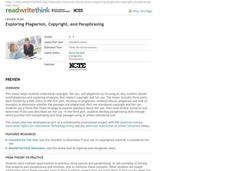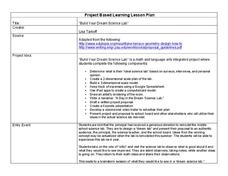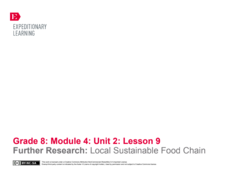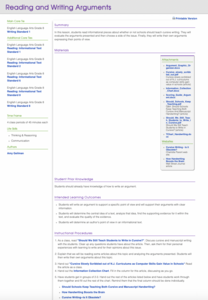National Math + Science Initative
Reading an Informational Text: "It All Started with Sputnik"
Sputnik was one of the greatest scientific advancements of the 1950s, and this reading lesson does it justice. Pupils start off with pre-reading questions and a video. They then read an excerpt from an article, which is accompanied by...
Open Oregon Educational Resources
How to Learn Like a Pro!
What's the best way to ace an exam or pass a difficult class? Scholars find out using an information-packed eBook. Pupils read about learning styles, study skills, test-taking strategies, and other topics associated with maximizing...
Missouri Department of Elementary
So Much to Do, So Little Time: How Do I Tie All of the Loose Ends Together?
How do people manage to get everything done when there are so few hours in a day? Scholars explore the question as they participate in small group discussions about time management. They construct a daily schedule and complete a...
K20 LEARN
Writing An Argumentative Paragraph: Argumentative Writing
Learning how to craft a cogent argument based on a solid claim, supported with evidence and solid reasoning, is an important life skill. Teach middle schoolers about argumentative writing with a lesson plan asking them to analyze the...
Facing History and Ourselves
How Journalists Minimize Bias
Class members are challenged to write a neutral news story about the events they observe in a short video. After sharing their stories in groups and discussing the different perceptions, the class concludes with a video of journalists...
Dream of a Nation
Writing an Analytic Essay
After researching an issue introduced in Tyson Miller's Dream of a Nation: Inspiring Ideas for a Better America, writers develop an original thesis statement and craft an analytic essay using evidence collected in their research.
ReadWriteThink
Exploring Plagiarism, Copyright, and Paraphrasing
Plagiarism, copyright, and fair use are the focus of a three-part instructional activity designed to inform scholars of how to properly cite others' work. First, pupils use a KWL chart to begin thinking and discussing plagiarism. They...
PBS
Facts vs. Opinions vs. Informed Opinions and their Role in Journalism
Do reporters write about what they see, or what they think? Examine the differences between investigative writing and opinion writing with a lesson from PBS. Learners look over different examples of each kind of reporting, and convince...
Curated OER
Build Your Dream Science Lab
Would your ideal science lab be filled with bubbling beakers and zapping Tesla coils? Or would it contain state-of-the-art computer technology and data analysis? Dream big with an innovative lesson that connects math and language arts...
Curated OER
Who Knows? Your Privacy in the Information Age
Teach young adults how to become advocates for their privacy in the modern information age. In a series of five lessons, learners explore their beliefs and opinions about privacy vs. the actual laws regarding who has the right to access...
EngageNY
Further Research: Local Sustainable Food Chain
Researchers review how to create citations, find reliable sources, and paraphrase. Next, using guided task cards and their researcher's notebooks, they investigate the question they developed in instructional activity eight about the...
EngageNY
End of Unit 2 Assessment, Part 1:Drafting the Argument Essay
An informative resource instructs pupils on how to write their essay drafts about the theme of control in Shakespeare's A Midsummer Night's Dream. Next, scholars complete an Exit Ticket, listing their three favorite characters from the...
New York City Department of Education
What Did I Do to Be so Black and Blue: How Did Jazz Influence Ralph Ellison's Invisible Man
How did jazz influence Ralph Ellison's Invisible Man? Class members read some of Ellison's non-fiction writings about blues and jazz, listen to records, watch videos, and engage in student-centered discussions. They then produce podcasts...
National History Day
Heroes Who Made a Difference: Memorializing a Distinguished Service Cross Award Recipient
Ever wonder how to memorialize World War I heroes in the classroom? Activities in a high-quality social studies resource prompt middle schoolers to research Internet sources, complete a graphic organizer, and write an editorial feature...
Scholastic
A Reading Guide to A Wrinkle in Time
Accompany a reading of Madeleine L'Engle's classic tale, A Wrinkle in Time, with a detailed guide equipped with 15 informative and useful chapters. Scholars discover who the author is, why she wrote the book, and crucial story elements...
Smithsonian Institution
Solomon G. Brown: Letter Writing
Personal correspondence in the form of letters is not as common as it once was. This resource presents an opportunity for you to introduce your class to letter writing and cover topics in social studies. Learners read a letter written in...
Curated OER
Reading and Writing Arguments
Should schools continue to teach cursive writing? After reading and considering the merits of a series of arguments on both sides of this proposition, class members choose a side of the issue and craft their own argument, drawing support...
Oakland Unified School District
Class Animal Report
Whether preparing your second graders for an expository writing proficiency assessment or just planning on introducing the writing process, this 37-page packet is for you. The unit has everything you need from scripted lessons to...
Gourmet Curriculum Press
Author's Purpose
Who knew determining author's purpose could be turned into a game? Four teams compete to correctly identify the author's purpose for writing a series of passages.
EngageNY
End of Unit Assessment: On-Demand Informational Paragraph About How the Poison Dart Frog Survives
A final assessment marks the end of a unit that takes a close look at a variety of informational texts all about frogs. A graphic organizer aides scholars in planning an accordion paragraph using their recorder forms from previous...
Curriculum
Expository Writing
The beauty of the way this expository writing resource is structured is that the units can be presented as a complete writing workshop or sequenced throughout a course of study
East Lyme Public Schools
To Declare or Not to Declare Independence?
Class members adopt the persona of real figures in American history, Patriots and Loyalists, research these individuals to determine their stance, and then debate the question of whether or not to declare independence from England.
Curated OER
Lesson Plan: How Coyote Came to Shuffle Off to Buffalo
Creative kids read, discuss, play-act, and sketch to examine the cultural significance of Old Man Coyote. They listen to several stories involving Coyote, analyze the Harry Fonseca painting Shuffle Off to Buffalo, and write Coyote...
Curated OER
Unit 2: Global to Local: Understanding My Place in the Hydrosphere
What does the ground around your home have to do with water pollution? Young ecologists learn about their local watershed and create their own cause-and-effect models of the hydrosphere.

























